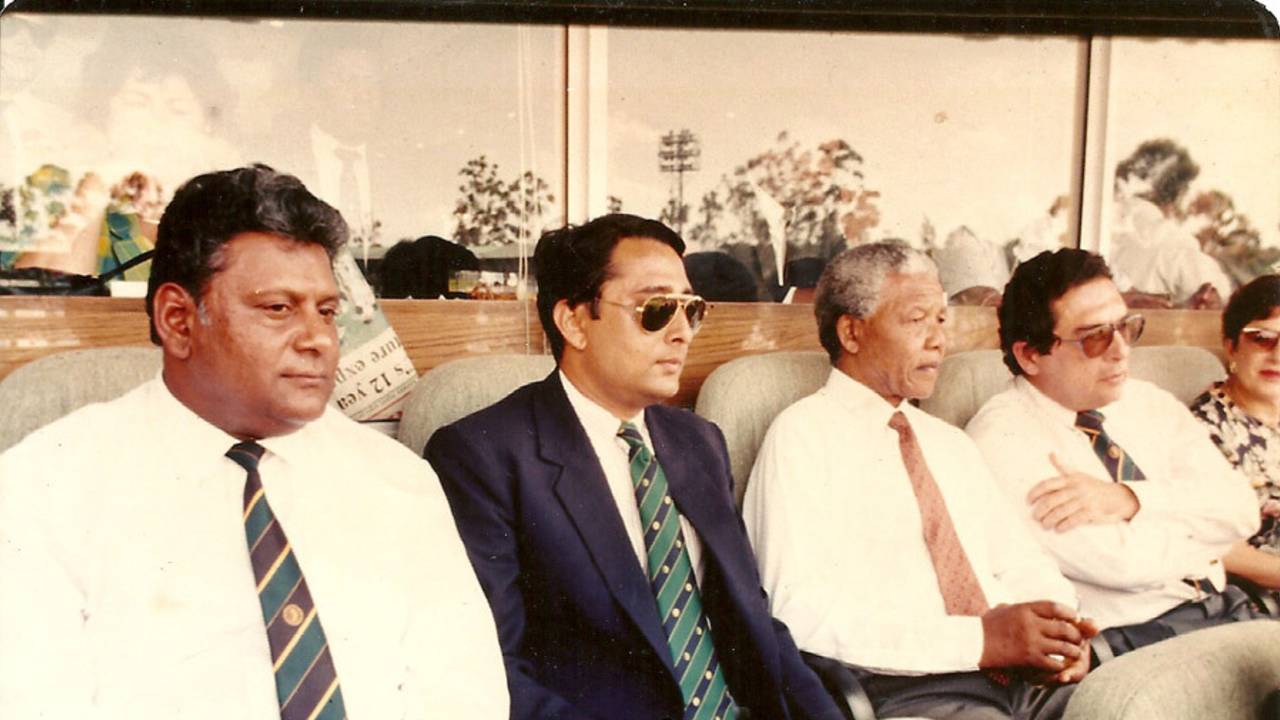A view from the inside out by one of Indian cricket's key insiders
Amrit Mathur's book offers rare behind-the-scenes glimpses at the highs and lows of three decades of the game through his time as journalist, administrator and team manager
Debayan Sen
Sep 1, 2023, 2:44 AM
Mathur (second from left) with Nelson Mandela and Ali Bacher at the 2003 World Cup in South Africa • ESPNcricinfo Ltd
If you've ever wondered what pre-match routines Sachin Tendulkar or Sourav Ganguly typically went through, or how chaotic the initial years of the IPL were, or how cannily the best cricket administrators work out the arithmetic during BCCI elections, you will get a lot of insights in Amrit Mathur's Pitchside: My Life in Indian Cricket. Mathur is the ultimate Indian cricket insider, having spent time in the system as administrator, journalist, manager on several historic tours, as a member of organising committees in World Cups, and advisor to IPL teams. He has also held several posts in the BCCI.
By his own admission, he was fortunate to be handpicked - "I think of myself as a concussion sub, someone not supposed to play but unexpectedly pushed into the middle" - first by erstwhile BCCI president Madhavrao Scindia, and then several others, as a young bureaucrat with Indian Railways.
The good thing about Pitchside is that Mathur stays true to the title and presents us with an objective view of what he saw and heard. There are great anecdotes from some historic India campaigns that fans will lap up - the tour of South Africa in 1992, the 2003 World Cup, the 2004 tour to Pakistan (including the political ambivalence right up until Sourav Ganguly's team set off, with then board president Jagmohan Dalmiya standing up to an unnamed senior minister and refusing to pull the plug on the tour on the government's behalf), and also from his time with Delhi Daredevils (now Capitals) in the IPL.
In Mathur's telling of his early days in the game, of his all-star St Stephen's College team-mates (Arun Lal, Piyush Pandey, Rajinder Amarnath, Ramchandra Guha) and Delhi University colleagues (Kirti Azad, Sunil Valson, Randhir Singh), I found parallels in my own life. When I went to the same college two decades later, any inter-departmental cricket game pitted you against Ranji Trophy players from Delhi, Himachal Pradesh, Haryana, Punjab. Hindu College, rivals from across the road, acquired the services of Gautam Gambhir during my final year there.
This star cast also makes routine appearances in his stories. The writing style is informal, with the private thoughts of titans of the sport, gleaned in conversation, appearing as bullet points at the end of several sections. The descriptions of the 2002 tour of England, capped by the NatWest Trophy win, and a stirring fightback in the Test series, give a fine picture of how the meticulous John Wright and the erratic Ganguly forged a coach-captain combination that had its share of highs and lows.

Westland Books
I did, however, have two minor quibbles with the book. First, Mathur had a ringside view of two of Indian cricket's greatest match-fixing scandals. He steers clear of the whole subject, which feels a bit like shortchanging the reader. Given his deep roots within Indian cricket, he may not have felt comfortable revealing ugly secrets about players and officials he has admired. There is also the possibility that he may not have known enough to talk with any authority.
He also provides detailed pen sketches of various characters in Indian cricket right at the end. Interestingly, second mentions of characters are first names for various players and functionaries - see Sachin, Sourav/Dada, Gavaskar, Lalit, Jaggu-da - but for others, he uses Mr Scindia and Mr Jaitley. This might be out of reverence for the deceased, but it confirms that in Indian cricket the politician has an unjustified pride of place that the best players cannot quite aspire to yet, even in the words of one of the most honest and upright servants of the sport.
